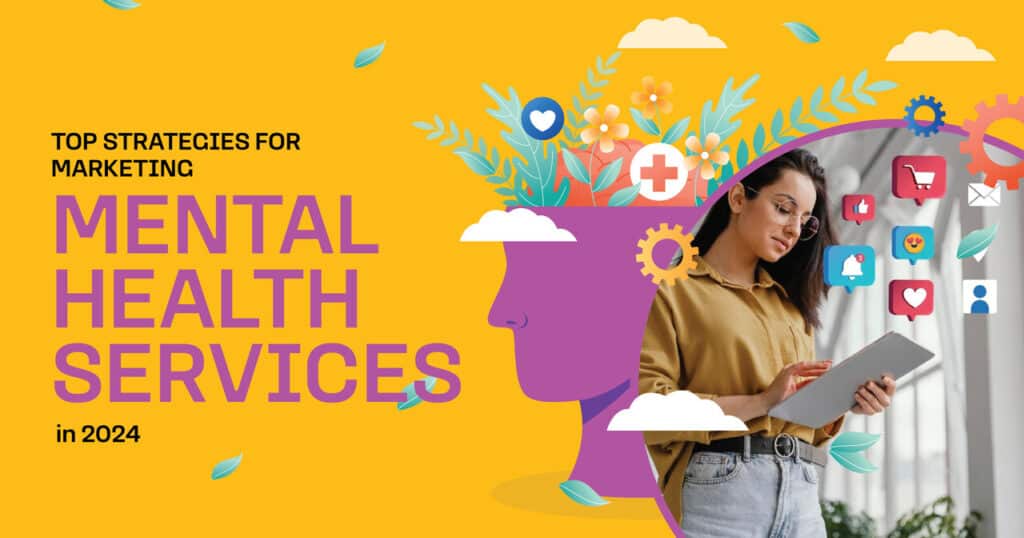The landscape of mental health services is evolving rapidly. As we approach 2024, marketing these services requires a fresh approach.
The stigma surrounding mental health is gradually fading. More people are seeking help, and mental health services are in high demand.
However, reaching potential clients is more complex than it seems. Traditional marketing strategies may need to be more effective in this sensitive and complex field.
This is where mental health services marketing comes into play. It’s a specialized approach that combines empathy, understanding, and strategic thinking.
This article will explore the top strategies for marketing mental health services in 2024. We will delve into the importance of a patient-centric approach, the power of storytelling, and the role of data-driven insights.
We will also discuss how to leverage social media for mental health awareness and the best practices for SEO optimization of mental health services websites.
This guide will provide valuable insights whether you’re a mental health professional, a healthcare marketing expert, or a mental health advocate. Let’s navigate the future of mental health services marketing together.
Understanding the Landscape of Mental Health Services Marketing
The marketing landscape for mental health services is unique. This field deals with sensitive issues, requiring a delicate balance between promotion and empathy.
The stigma associated with mental health is a significant barrier. It can prevent people from seeking help, even when they need it the most. Therefore, marketing strategies must aim to break down these barriers and normalize mental health discussions.
The rise of digital technology has also reshaped the landscape. More people are turning to online platforms to seek help, making online visibility crucial for mental health service providers. Digital touchpoints are essential in reaching potential clients, from websites to social media platforms.
However, the digital landscape is also fraught with challenges. Privacy concerns, misinformation, and the need for immediate support are some of the issues that mental health service providers must navigate. Therefore, a robust online presence must be coupled with ethical practices and a deep understanding of the digital space.
Understanding the landscape of mental health services marketing is the first step toward crafting effective strategies. It’s about recognizing this field’s unique challenges and opportunities and leveraging them to connect with those in need.
The Imperative of a Patient-Centric Marketing Approach
In mental health services marketing, a patient-centric approach is paramount. This approach places the needs and experiences of the patient at the center of all marketing efforts. It’s about understanding the patient’s journey, from the moment they recognize a problem to the point they seek help.
A patient-centric approach also involves empathy and understanding. It’s about recognizing the emotional and psychological challenges that individuals face when dealing with mental health issues. This understanding should be reflected in all marketing communications, from website content to social media posts.
A patient-centric marketing approach is about more than just promoting services. It’s about creating a supportive environment where individuals feel understood and encouraged to seek help. It’s about building trust and showing potential clients that their well-being is the primary concern.
Leveraging Storytelling to Connect and Engage
Storytelling is a powerful tool in mental health services marketing. It allows organizations to connect with their audience on a deeper, more emotional level. By sharing real-life stories of recovery and resilience, organizations can inspire hope and encourage individuals to seek help.
Stories can also help to humanize mental health issues. They can break down barriers, challenge stereotypes, and foster a greater understanding of mental health. This can be particularly effective in reducing stigma and promoting mental health awareness.
Incorporating storytelling into marketing strategies requires sensitivity and respect. It’s essential to ensure that stories are shared in a way that respects individuals’ privacy and dignity. With careful planning and execution, storytelling can be a powerful way to engage audiences and promote mental health services.
Data-Driven Marketing: Tailoring Strategies to Audience Needs
Data is a valuable asset in the digital age. It provides insights into audience behavior, preferences, and needs. For mental health services marketing, leveraging data can help tailor strategies to meet the target audience’s needs.
Data can reveal patterns and trends that can inform marketing decisions. For instance, data can show which types of content resonate most with the audience or which social media platforms are most effective for reaching potential clients. This can help organizations optimize their marketing efforts and achieve better results.
However, using data in marketing requires careful handling. It’s important to respect privacy regulations and ethical guidelines. This includes obtaining consent for data collection and ensuring data is stored and used securely.
Critical considerations for data-driven marketing include:
- Understanding the audience: Use data to gain insights into the audience’s needs, preferences, and behaviors.
- Personalizing content: Use data to tailor content to the audience’s interests and needs.
- Measuring success: Use data to track the effectiveness of marketing campaigns and make necessary adjustments.
- Respecting privacy: Ensure data collection and use comply with privacy regulations and ethical guidelines.
Maximizing Social Media for Mental Health Awareness
Social media platforms have become powerful tools for raising mental health awareness. They offer a platform for sharing stories, disseminating information, and fostering a sense of community. For mental health services marketing, social media can be a game-changer.
The key to successful social media marketing is understanding each platform’s unique characteristics. Facebook, for instance, is great for sharing long-form content and engaging with a broad demographic. On the other hand, Instagram is ideal for sharing visually compelling content and reaching a younger audience.
Engagement is crucial in social media marketing. This means posting content, interacting with followers, responding to comments, and participating in relevant conversations. It’s about building relationships and fostering a sense of community.
Finally, it’s important to remember that social media is a two-way street. It’s not just about broadcasting messages but also listening to what others say. This can provide valuable insights to inform marketing strategies and help improve services.
SEO Best Practices for Mental Health Services Websites
Search engine optimization (SEO), including mental health services marketing, is critical to any digital marketing strategy. It’s about making your website visible to people searching for mental health services online.
The first step in SEO is keyword research. This involves identifying the words and phrases people use to search for mental health services. You should incorporate these keywords into your website content, meta tags, and URLs.
Another important aspect is on-page SEO, which includes optimizing your website’s content and HTML source code. On the other hand, off-page SEO involves activities that drive referral traffic to your website, such as backlinking.
Here are some SEO best practices to consider:
- Use relevant keywords in your content, but avoid keyword stuffing.
- Make sure your website is mobile-friendly.
- Use internal and external links to boost your SEO.
- Regularly update your website with fresh, high-quality content.
- Ensure your website loads quickly.
The Significance of Mobile Optimization in Reaching Audiences
In today’s digital age, mobile optimization is no longer an option but a necessity. More people use their smartphones to access information online, including mental health resources. If your website is mobile-friendly, you could take advantage of a significant portion of your potential audience.
Mobile optimization involves designing your website for easy use on a mobile device. This includes ensuring that text is readable, links and buttons are easily clickable, and navigation is user-friendly. It’s not just about shrinking your website to fit a smaller screen but creating a seamless user experience regardless of the device used.
Moreover, Google has implemented mobile-first indexing. This means that the search engine primarily uses a website’s mobile version for indexing and ranking. Hence, if your website isn’t optimized for mobile, it could negatively impact your SEO efforts.
Creating High-Quality Content that Addresses Mental Health Issues
Creating high-quality content is a cornerstone of any successful mental health services marketing strategy. It’s about promoting your services and providing valuable information that addresses mental health issues. This approach positions your organization as a trusted resource, which can lead to increased engagement and conversions.
Content can take many forms, from blog posts and articles to infographics and videos. The key is to ensure that it’s informative, accurate, and relevant to your audience’s needs. It’s also essential to present complex mental health topics in a way that’s easy to understand without oversimplifying or trivializing them.
In addition, your content should be optimized for SEO to increase its visibility online. This involves conducting keyword research to understand what terms your audience uses to search for mental health information and then incorporating these keywords into your content naturally and meaningfully.
Lastly, regularly update your content to keep it current and relevant. This provides ongoing value to your audience and signals to search engines that your website is active and up-to-date, which can boost your SEO rankings.
Engaging Potential Clients with Video Content
Video content is a powerful tool for engaging potential clients in mental health services marketing. It offers a dynamic and immersive way to convey information, making it easier for viewers to understand and connect with the content.
Videos can explain complex mental health concepts, share patient testimonials, or provide a behind-the-scenes look at your services. They can also host live Q&A sessions or webinars, providing an interactive platform for potential clients to engage with your organization.
However, ensuring that your video content is high-quality and professionally produced is essential. Poorly made videos can harm your brand’s image and credibility. Also, remember to optimize your videos for SEO by including relevant keywords in the title, description, and tags. This will help increase their visibility on search engines and video-sharing platforms.
Integrating Mental Health Apps and Teletherapy into Marketing
The rise of digital technology has revolutionized the mental health sector. Mental health apps and teletherapy services have become increasingly popular, providing convenient and accessible options for individuals seeking help. Integrating these digital tools into your marketing strategy can significantly enhance your reach and appeal.
Mental health apps can be promoted as complementary tools to your services. They can provide self-help resources, therapy exercises, or mood-tracking features. Highlighting these apps in your marketing materials can demonstrate your commitment to providing comprehensive care.
Teletherapy, on the other hand, allows clients to receive therapy from the comfort of their homes. It’s particularly beneficial for those living in remote areas or with mobility issues. Marketing your teletherapy services can help you reach a wider audience and position your organization as a forward-thinking provider in the mental health field.
Email Marketing: Building Trust and Maintaining Client Relationships
Email marketing remains a powerful tool for building trust and maintaining client relationships. It allows for personalized communication, which is crucial in the mental health sector. By sending regular newsletters, updates, and helpful resources, you can keep your clients engaged and informed.
One effective strategy is segmenting your email list based on your client’s needs and interests. This allows you to tailor your content and provide more relevant information. For instance, you could send targeted emails about anxiety management techniques to clients interested in this topic.
Remember, the goal of email marketing in mental health services is to promote your services and provide value and support to your clients. This approach builds trust and positions your organization as a reliable source of help and information in the mental health field.
Influencer Partnerships: Expanding Reach and Authenticity
Influencer partnerships can be a powerful way to expand your reach and add authenticity to your mental health services marketing. Influencers, particularly those who openly discuss mental health, can help destigmatize mental health issues and encourage their followers to seek help.
When choosing influencers to partner with, it’s essential to consider their audience and their approach to mental health. The ideal influencer should have a following that aligns with your target audience and shares your organization’s values and commitment to mental health awareness.
Remember, authenticity is critical in mental health marketing. Partnering with influencers who genuinely care about mental health can help your organization connect with potential clients on a deeper level. This strategy can significantly enhance your online visibility and contribute to your overall mental health marketing strategies.
Ethical Considerations in Mental Health Marketing
Marketing mental health services requires a careful balance. On the one hand, you want to promote your services and reach those in need. On the other, you must respect the sensitive nature of mental health issues and the privacy of potential clients.
Ethical marketing practices in healthcare are crucial. This includes being transparent about your services, avoiding exaggerated claims, and respecting patient confidentiality. It’s also important to consider the impact of your marketing messages on those struggling with mental health issues. Avoid stigmatizing language and ensure your content is supportive and empowering.
Remember, mental health services marketing aims to attract clients and contribute to mental health awareness and understanding. By adhering to ethical marketing practices, you can build trust with your audience and position your organization as a reliable source of help.
Measuring the Success of Your Mental Health Marketing Campaigns
Measuring success in mental health services marketing goes beyond just tracking conversions and website traffic. It’s about understanding the impact of your marketing efforts on your audience and the wider community.
Key performance indicators (KPIs) can help you gauge the effectiveness of your marketing strategies. These may include metrics related to website engagement, social media reach, email open rates, and client acquisition. However, it’s also essential to consider qualitative measures, such as client feedback and testimonials.
Here are some KPIs to consider:
- Website traffic and engagement metrics (bounce rate, session duration, pages per session)
- Social media engagement (likes, shares, comments)
- Email open and click-through rates
- Number of new clients acquired
- Client satisfaction scores
- Feedback and testimonials
Remember, the ultimate goal of your marketing efforts is to help those in need of mental health services. Therefore, the accurate measure of success is your positive impact on people’s lives.
Conclusion: The Future of Mental Health Services Marketing
As we look towards the future, it’s clear that the landscape of mental health services marketing will continue to evolve. Technological advancements, changing societal attitudes toward mental health, and the ongoing need for accessible, high-quality mental health services will all play a role in shaping the future of this field.
Mental health service providers must stay abreast of the latest marketing trends and strategies in this ever-changing landscape. They must continue to prioritize a patient-centric approach, leverage data-driven insights, and utilize the power of storytelling to connect with their audience. Above all, they must remain committed to promoting mental health awareness and reducing stigma.
In conclusion, the future of mental health services marketing lies in the ability to adapt, innovate, and maintain a deep commitment to serving the community’s mental health needs. The strategies outlined in this article provide a roadmap for achieving these goals and ensuring the continued growth and success of your mental health services.







